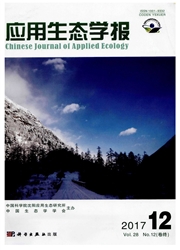

 中文摘要:
中文摘要:
To compare the adsorption kinetics of Cu, Zn and Cd introduced into red soils simultaneously and sequentially as well as their distribution coefficients, the ability of red soils to retain heavy metals was evaluated by performing batch experiments. The results indicate that Cu is preferentially adsorbed by red soils no matter in simultaneous or in sequential situation. The adsorption amount of Cd is the minimum in simultaneous competitive adsorption experiment. As heavy metals are added into red soils sequentially, the heavy metal adsorptions are relatively hard to reach equilibrium in 2 h. Red soils retain more Cd than Zn, which is opposite to the result in simultaneous adsorption. The addition sequences of heavy metals affect their adsorbed amounts in red soils to a certain extent. The joint distribution coefficients of metals in simultaneous adsorption are slightly higher than those in sequential adsorption.
 英文摘要:
英文摘要:
To compare the adsorption kinetics of Cu, Zn and Cd introduced into red soils simultaneously and sequentially as well as their distribution coefficients, the ability of red soils to retain heavy metals was evaluated by performing batch experiments. The results indicate that Cu is preferentially adsorbed by red soils no matter in simultaneous or in sequential situation. The adsorption amount of Cd is the minimum in simultaneous competitive adsorption experiment. As heavy metals are added into red soils sequentially, the heavy metal adsorptions are relatively hard to reach equilibrium in 2 h. Red soils retain more Cd than Zn, which is opposite to the result in simultaneous adsorption. The addition sequences of heavy metals affect their adsorbed amounts in red soils to a certain extent. The joint distribution coefficients of metals in simultaneous adsorption are slightly higher than those in sequential adsorption.
 同期刊论文项目
同期刊论文项目
 同项目期刊论文
同项目期刊论文
 Effects of Combined Phosphorus-Zinc Fertilization on Grain Zinc Nutritional Quality of Wheat Grown o
Effects of Combined Phosphorus-Zinc Fertilization on Grain Zinc Nutritional Quality of Wheat Grown o 期刊信息
期刊信息
